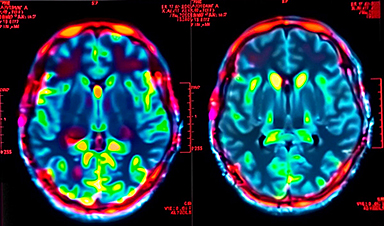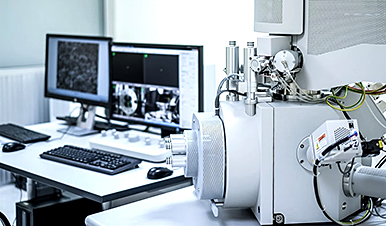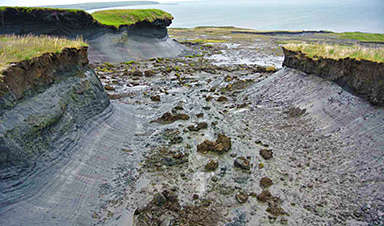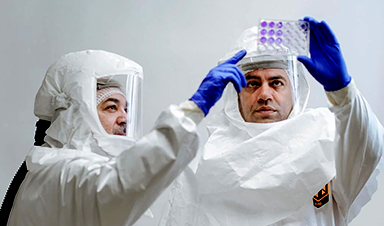- Virtual patients, vaccines, medicine-making biomachines and microneedles are examples of tech innovation that is meeting the moment to address the global health crisis.
- Health has been a strong focus for this year’s top 10 emerging technologies.
- Technology can drive a Great Health Reset, but success will be determined by the willingness of all stakeholders to trust one another and to invest in a shared effort.
This year’s Top 10 Emerging Technologies, revealed in a new report produced in partnership with Scientific American, are meeting the moment to fuel a “Great Reset”: a complete redesign of how we manage the current crisis and prevent or mitigate the next one.
Tech innovation is the agent of change. The current cohort, with those of earlier editions, offer solutions to the world’s most pressing challenges – notably the global health crisis and its economic fallout, alongside the ongoing climate emergency.
COVID-19 has exposed the global cooperation gap
The pandemic persists despite the extraordinary efforts of a global medical community to contain and expunge the underlying virus. Perhaps more concerning, the absence of a coordinated global approach to containment and resolution has likely expanded and extended its impact.
Two divergent yet critically entwined issues arise: the technological resources brought to bear in addressing this pandemic, and the global international governance and coordination required to achieve best outcomes.
One of this year’s Top 10, virtual patients – which replace humans with simulations – could make clinical trials faster and safer. Microneedles that provide painless injections, another technology on the list, could speed drug delivery for the prevention and treatment of viruses like COVID-19. A third tech, whole-genome synthesis, enables researchers to design genetic sequences that could be introduced into microbes to turn them into medicine-making biomachines.
Deep technical capabilities such as these executed in isolation are likely to be ineffective, as would be well-coordinated international efforts that are absent the required technologies. In achieving the Great Health Reset, both global governance and emergent technologies will play central roles together.
Reasons for optimism – virus hunting and pandemic bashing
To avoid future pandemics, access to what is traditionally seen as protected health data is critical. Such transparency is not supported by many nations today, and the current pandemic is in part a consequence of the time lag from disease discovery to reporting. It is a systemic, global problem.
The world needs to move towards a system where local healthcare providers, and their local government leadership, recognize and report data “up the chain of command.” Sequential reporting delays, or data suppression, costs lives as the disease vector spreads unchecked. Ideally, the autonomous collection and interpretation of medical reports in real time and on a global scale would drastically improve disease discovery.
News
Does COVID increase the risk of Alzheimer’s disease?
Scientists discover that even mild COVID-19 can alter brain proteins linked to Alzheimer’s disease, potentially increasing dementia risk—raising urgent public health concerns. A recent study published in the journal Nature Medicine investigated whether both mild and [...]
New MRI Study Reveals How Cannabis Alters Brain Activity and Weakens Memory
A massive new study sheds light on how cannabis affects the brain, particularly during cognitive tasks. Researchers analyzed over 1,000 young adults and found that both heavy lifetime use and recent cannabis consumption significantly reduced brain [...]
How to Assess Nanotoxicity: Key Methods and Protocols
With their high surface area and enhanced physicochemical properties, nanomaterials play a critical role in drug delivery, consumer products, and environmental technologies. However, their nanoscale dimensions enable interactions with cellular components in complex and [...]
Nanotech drug delivery shows lasting benefits, reducing need for repeat surgeries
A nanotechnology-based drug delivery system developed at UVA Health to save patients from repeated surgeries has proved to have unexpectedly long-lasting benefits in lab tests – a promising sign for its potential to help human patients. [...]
Scientists Just Found DNA’s Building Blocks in Asteroid Bennu – Could This Explain Life’s Origins?
Japanese scientists detected all five nucleobases — building blocks of DNA and RNA — in samples returned from asteroid Bennu by NASA’s OSIRIS-REx mission. NASA’s OSIRIS-REx mission brought back 121.6 grams of asteroid Bennu, unveiling nitrogen-rich organic matter, including DNA’s essential [...]
AI-Designed Proteins – Unlike Any Found in Nature – Revolutionize Snakebite Treatment
Scientists have pioneered a groundbreaking method to combat snake venom using newly designed proteins, offering hope for more effective, accessible, and affordable antivenom solutions. By utilizing advanced computational techniques and deep learning, this innovative [...]
New nanosystem offers hope for improved diagnosis and treatment of tongue cancer
A pioneering study has unveiled the Au-HN-1 nanosystem, a cutting-edge approach that promises to transform the diagnosis and treatment of tongue squamous cell carcinoma (TSCC). By harnessing gold nanoparticles coupled with the HN-1 peptide, [...]
Global Trust in Science Is Stronger Than Expected – What’s Next?
A landmark global survey conducted across 68 countries has found that public trust in scientists remains robust, with significant support for their active involvement in societal and political matters. The study highlights the public’s [...]
Microplastics in the bloodstream may pose hidden risks to brain health
In a recent study published in the journal Science Advances, researchers investigated the impact of microplastics on blood flow and neurobehavioral functions in mice. Using advanced imaging techniques, they observed that microplastics obstruct cerebral blood [...]
AI Surveillance: New Study Exposes Hidden Risks to Your Privacy
A new mathematical model enhances the evaluation of AI identification risks, offering a scalable solution to balance technological benefits with privacy protection. AI tools are increasingly used to track and monitor people both online [...]
Permafrost Thaw: Unleashing Ancient Pathogens and Greenhouse Gases
Permafrost is a fascinating yet alarming natural phenomenon. It refers to ground that remains frozen for at least two consecutive years. Mostly found in polar regions like Siberia, Alaska, and Canada, permafrost plays a [...]
Frequent social media use tied to higher levels of irritability
A survey led by researchers from the Center for Quantitative Health at Massachusetts General Hospital and Harvard Medical School has analyzed the association between self-reported social media use and irritability among US adults. Frequent [...]
Australian oysters’ blood could hold key to fighting drug-resistant superbugs
Protein found in Sydney rock oysters’ haemolymph can kill bacteria and boost some antibiotics’ effectiveness, scientists discover An antimicrobial protein found in the blood of an Australian oyster could help in the fight against [...]
First U.S. H5N1 Death Sparks Urgency: Scientists Warn Bird Flu Is Mutating Faster Than Expected
A human strain of H5N1 bird flu isolated in Texas shows mutations enabling better replication in human cells and causing more severe disease in mice compared to a bovine strain. While the virus isn’t [...]
AI Breakthrough in Nanotechnology Shatters Limits of Precision
At TU Graz, a pioneering research group is leveraging artificial intelligence to drastically enhance the way nanostructures are constructed. They aim to develop a self-learning AI system that can autonomously position molecules with unprecedented precision, potentially [...]
How Missing Sleep Lets Bad Memories Haunt Your Mind
Research reveals that a lack of sleep can hinder the brain’s ability to suppress unwanted memories and intrusive thoughts, emphasizing the importance of restful sleep for mental health. Sleep deprivation has been found to [...]






















